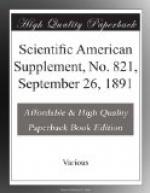Everything tending to increased or fuller respiration is to be encouraged, for the fats are thus supplied with oxygen, hastening their disintegration and consumption.
Direct medicinal treatment presents no very wide scope. Bouchard imagines lime water may be useful by accelerating nutrition, but this is problematical, since fat in emulsion or in droplets does not burn. Nevertheless, alkalies in general, alkaline carbonates, liquor potassa, soaps, etc., aid in rendering fat more soluble, and consequently more susceptible to attack. The alkaline waters, however, are much less active in obesity than the saline mineral waters, unless, as sometimes happens, there is a complication of diabetes and obesity.
Purgatives are always more or less useful, and often required to be renewed with all the regularity of habit. Then too, the iodides, especially iodide of sodium or potassium, as recommended by M. Germain See, frequently prove of excellent service by aiding elimination and facilitating the mutations.
According to Kisch, the cold mineral waters containing an abundance of sulphate of soda, like Hunyadi and Marienbad, are to be preferred to the hot mineral waters, such as Carlsbad, because of their lesser irritant action on the vascular system, and because they strongly excite diuresis through their low temperature and contained carbonic acid; Carlsbad deserves preference only when obesity is combined with uric acid calculi, or with diabetes. For very anaemic persons, however, the weak alkaline and saline waters should be selected; or they should confine themselves to chalybeate waters containing an excess of sulphate of soda. Water containing sulphate of soda is also indicated as a beverage where there are troubles of the circulatory apparatus; it is contraindicated only in accentuated arterio-sclerosis.
As a matter of fact, I find the suggestion of M. Dujardin-Beaumetz, that the obese should be divided into two groups, a most practical one, for some are strong and vigorous—great eaters, perhaps even gluttons—while others, on the contrary, are feeble and debilitated, with flesh soft and flaccid; and upon the former may be imposed all the rigors of the reducing system, while the latter must be dealt with more carefully.
In general, it must be noted, the regimen prescribed for the obese is insufficient, as the following table prepared by M.C. Paul abundantly proves:
-------------------------+----------+----------+-------
-------- Author. |Albuminous| Fatty | | Matters. | Matters. | Hydrocarbons. -------------------------+----------+----------+------------
--- Voit. | 118 | 40 | 150 Harvey-Banting. | 170 | 10 | 80 Ebstein. | 100 | 85 | 50 Oertel. | 155-179 | 25-41 | 70-110 Kisch (plethoric). | 160 | 10 | 80 " (anaemic). | 200 | 12 | 100




